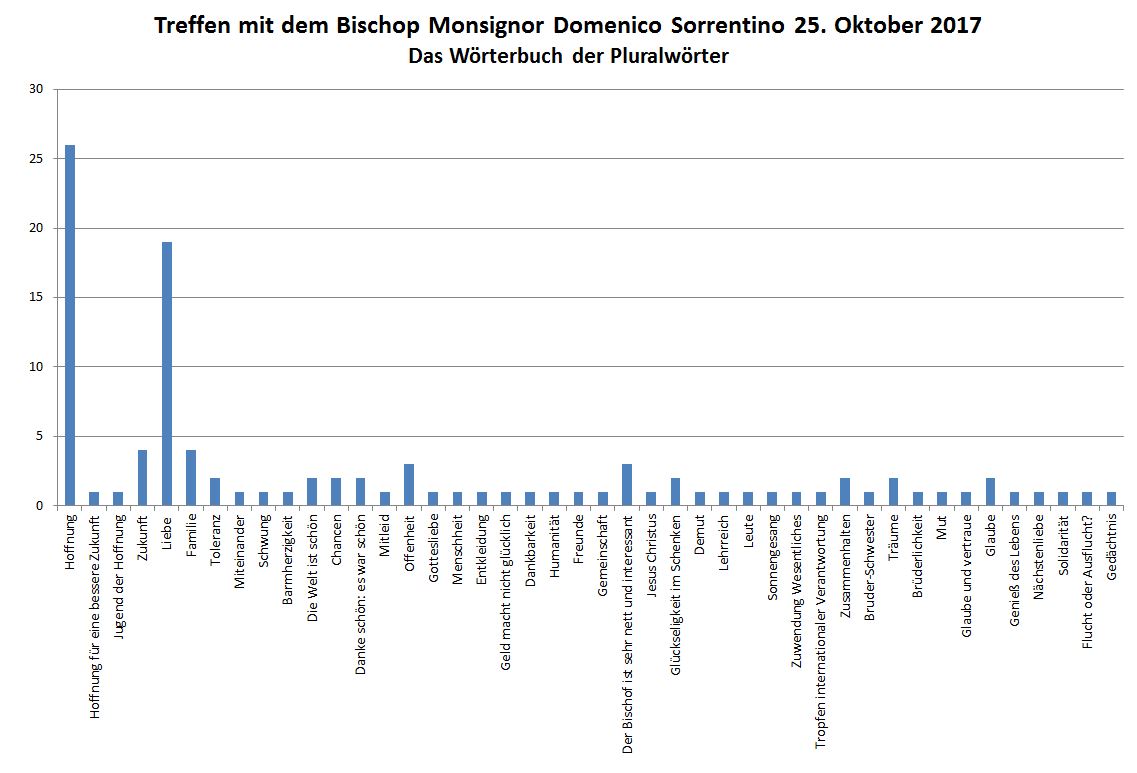Words in the Plural
by Rosella Baldelli Liceo Sesto Properzio, Assisi/Italy on 2018-01-11

Words can be singular or plural. This prescribes the grammar of every language.
We like words in the plural, because we do not want to lock ourselves up in the insidious cage of the false personal freedom. Being free does not mean thinking only or mainly about oneself, because man is first of all a social animal, as the great Aristotle was used to say ...
This is also the opinion of our bishop Domenico Sorrentino, who, in view of the difficult crisis of the emigrants living in Europe and, in particular, in Italy, wanted to welcome a refugee family into his home in the bishopric of Assisi . In reality he could welcome only what is left of a family, since the men are all dead during the sea crossing.
When we went to visit him with an international delegation of young Europeans from 5 different countries, Bishop Sorrentino told us this story. And the key words that were collected after the meeting are those contained in the graph above. The words are in German, because this was the official language of communication. Do you understand their meaning?
Assisi is the place of the annual meeting for the dialogue between all the main religious confessions.
Le parole possono essere al singolare o al plurale. Questo dice la grammatica di ogni lingua.
A noi piacciono le parole al plurale, perché non vogliamo rinchiuderci nella gabbia insidiosa della falsa libertà personale. Essere liberi non significa pensare solo o principalmente a se stessi, perché l’uomo è in prima persona un animale sociale, lo diceva persino il grande Aristotele…
Di questo avviso è anche il nostro vescovo Domenico Sorrentino, che, in considerazione della difficile crisi degli emigrati che sta vivendo l’Europa e, in particolare, l’Italia, ha voluto accogliere nella sua casa, nel vescovado di Assisi una famiglia di rifugiati. In realtà solo quello che è rimasto di una famiglia, visto che gli uomini sono tutti morti durante la traversata in mare.
Quando siamo andati a trovarlo con una delegazione internazionale di giovani europei provenienti da 5 diversi Paesi, il vescovo Sorrentino ci ha raccontato questa storia. E le parole chiave che sono state raccolte dopo l’incontro sono quelle contenute nel grafico di cui sopra. Le parole sono in tedesco, perché questa è stata la lingua ufficiale di comunicazione. Ne capisci il significato?
Assisi è infatti il luogo dell’incontro annuale per il dialogo tra tutte le principali confessioni religiose.




Rosella Baldelli
Liceo Sesto Properzio, Assisi/Italy on 2018-01-16
Johannes Brömmel
Gisela-Gymnasium, München/Germany (1999) on 2018-01-15
Isabel Deville
Gisela-Gymnasium, München/Germany (2000) on 2018-01-15